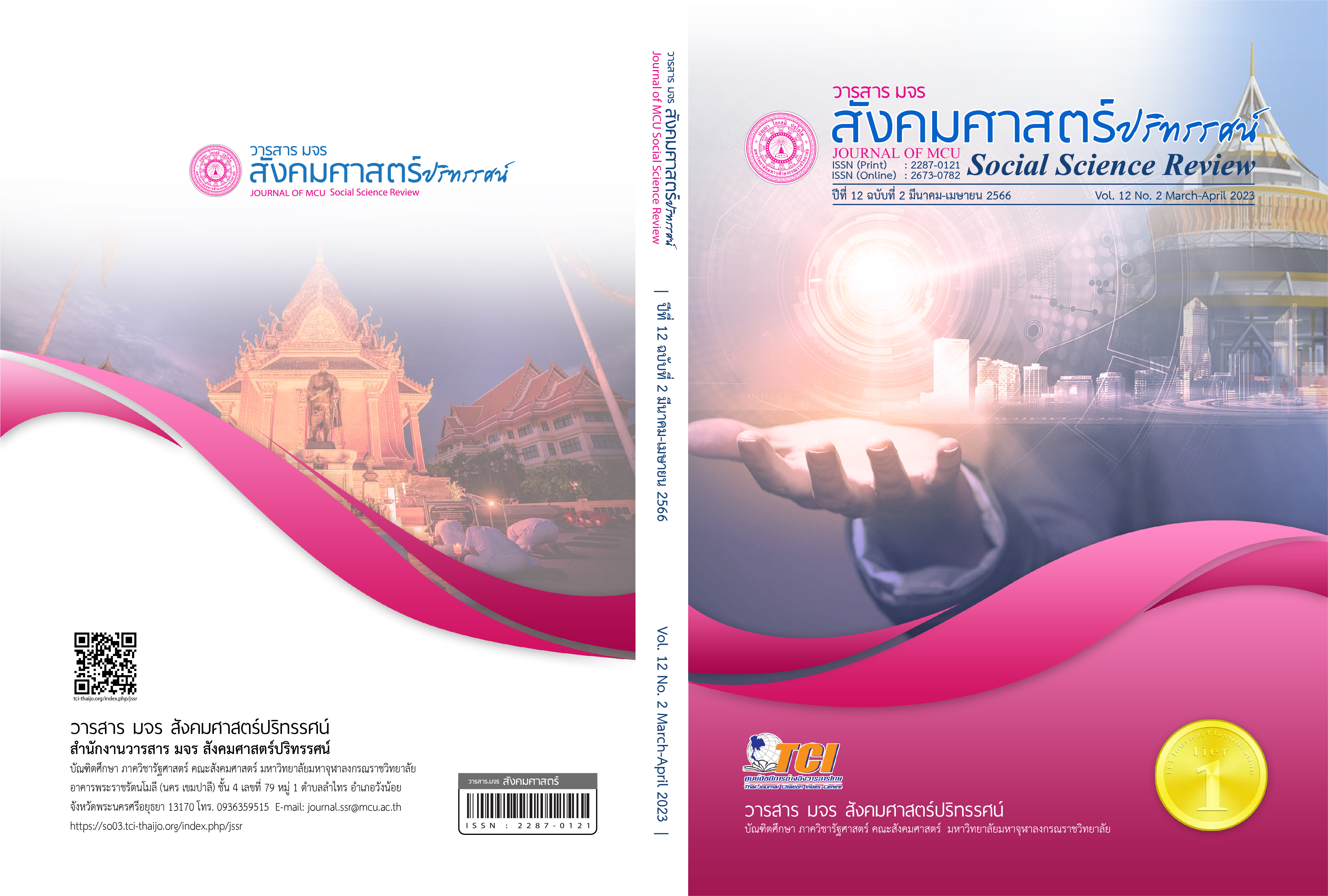การพัฒนาการบริหารมหาวิทยาลัยเอกชนไทย ตามแนวคิดมหาวิทยาลัยผู้ประกอบการ
คำสำคัญ:
การพัฒนา, การบริหาร, แนวคิดมหาวิทยาลัยผู้ประกอบการ, มหาวิทยาลัยเอกชนบทคัดย่อ
การวิจัยครั้งนี้เป็นการวิจัยแบบผสมผสานวิธี โดยมีวัตถุประสงค์เพื่อศึกษาสภาพปัจจุบัน สภาพที่พึงประสงค์และความต้องการจำเป็นของการบริหารมหาวิทยาลัยเอกชนไทยตามแนวคิดมหาวิทยาลัยผู้ประกอบการ และนำเสนอแนวทางการพัฒนาการบริหารมหาวิทยาลัยเอกชนไทยตามแนวคิดมหาวิทยาลัยผู้ประกอบการ กลุ่มตัวอย่าง ได้แก่ ผู้บริหารมหาวิทยาลัยเอกชน จำนวน 154 คน ใช้วิธีการสุ่มตัวอย่างแบบกลุ่ม และ กลุ่มผู้ทรงคุณวุฒิใช้วิธีการเลือกแบบเจาะจง จำนวน 5 คน เครื่องมือวิจัยใช้แบบสอบถาม และ แบบสัมภาษณ์ ที่ผ่านการตรวจสอบความสอดคล้องตามวัตถุประสงค์ผู้เชี่ยวชาญจำนวน 5 คนและหาค่าความเชื่อมั่นของแบบสอบถาม (Cronbach’s alpha coefficient) = .961 วิเคราะห์ข้อมูลโดยใช้สถิติพื้นฐาน ได้แก่ ความถี่ ค่าเฉลี่ย ส่วนเบี่ยงเบนมาตรฐาน ค่าดัชนีความต้องการจำเป็น (PNImodified) และการวิเคราะห์เนื้อหา
ผลการวิจัยพบว่า 1) สภาพปัจจุบันในภาพรวมอยู่ในระดับปานกลางและสภาพที่พึงประสงค์ในภาพรวมอยู่ในระดับมาก ส่วนความต้องการจำเป็นที่ต้องพัฒนา อันดับที่ 1 ผลการดำเนินงาน อันดับที่ 2 เครือข่ายความร่วมมือ และอันดับที่ 3 การจัดการทรัพย์สินทางปัญญา และ 2) แนวทางการพัฒนาการบริหารมหาวิทยาลัยเอกชนไทยตามแนวคิดมหาวิทยาลัยผู้ประกอบการประกอบด้วย 6 องค์ประกอบ 15 แนวทาง ได้แก่ 1) การจัดการองค์กร มี 3 แนวทาง 2) การจัดการเรียนรู้ มี 4 แนวทาง 3) การวิจัยและพัฒนานวัตกรรม มี 1 แนวทาง 4) การจัดการทรัพย์สินทางปัญญา มี 1 แนวทาง 5) เครือข่ายความร่วมมือ มี 2 แนวทาง และ6) ผลการดำเนินงาน มี 4 แนวทาง
เอกสารอ้างอิง
เขมกร ไชยประสิทธิ์ และ อรพิณ สันติธีรากุล. (2560). การเปรียบเทียบตัวแบบการพัฒนาผู้ประกอบการระหว่างประเทศไทยกับหมู่เกาะ AZORES ประเทศโปรตุเกส. วารสารปัญญาภิวัฒน์, 9 (ฉบับพิเศษ), 6-17.
ทรงพล มั่นคงสุจริต และคณะ. (2559). ศูนย์บ่มเพาะธุรกิจในมหาวิทยาลัยของประเทศไทย: สถานะปัจจุบันและโอกาสในการปรับปรุง. วารสารนักบริหาร, 36(2), 123-132.
มติชนออนไลน์. (2563). ทปอ.ถกวิกฤตเด็กลดลงปี’ 63 เหลือ 2 แสนคน มหา’ลัยเล็งปิดคณะตกอันดับ‘สาธารณสุข-บริหาร’ มาแรง. สืบค้น 2 พฤศจิกายน 2564, จาก https://www.matichon.co.th/ education/ news_1990888
สำนักงานคณะกรรมการการพัฒนาการเศรษฐกิจและสังคมแห่งชาติ สำนักนายกรัฐมนตรี. (2559). แผนพัฒนาเศรษฐกิจและสังคมแห่งชาติ ฉบับที่ 12 (พ.ศ. 2560 - 2564). กรุงเทพฯ: สำนักงานคณะกรรมการการพัฒนาการเศรษฐกิจและสังคมแห่งชาติ สำนักนายกรัฐมนตรี.
สำนักงานคณะกรรมการนโยบายวิทยาศาสตร์ เทคโนโลยีและนวัตกรรมแห่งชาติ (สวทน.). (2561). สัมมนาเชิงปฏิบัติการ “การเสริมสร้างศักยภาพผู้บริหารมหาวิทยาลัย เพื่อมุ่งสู่มหาวิทยาลัยแห่งการประกอบการ (Entrepreneurial University Executive Training)”. สืบค้น 14 เมษายน 2563, จาก https://www.sti.or.th/sti/news-detail.php?news_type=2&news_id=348&
สิทธิพล วิบูลย์ธนากุล. (2562). ทรัพย์สินทางปัญญา หัวใจสำคัญพัฒนาเศรษฐกิจ. กรุงเทพธุรกิจ. สืบค้น 24 มีนาคม 2563, จาก https://www.bangkokbiznews.com/blog/detail/647750
สุพิชชา ชีวพฤกษ์ และคณะ. (2561). ทิศทางสู่มหาวิทยาลัยแห่งการประกอบการด้วยการพัฒนาองค์กร. วารสารการจัดการสมัยใหม่, 16(1), 219-227.
อวิรุทธ์ ฉัตรมาลาทอง. (2560). ยุทธศาสตร์และโมเดลพันธกิจเพื่อพัฒนามหาวิทยาลัยวิจัยสู่มหาวิทยาลัยเชิงประกอบการ. (วิทยานิพนธ์ปริญญาดุษฎีบัณฑิต). กรุงเทพฯ: จุฬาลงกรณ์มหาวิทยาลัย.
Basci, E. S., & Alkan, R. M. (2015). Entrepreneurship Education at Universities: Suggestion for A Model Using Financial Support. Procedia-Social and Behavioral Sciences, 195(2015), 856-861.
Dinh, V.T. (2020). Entrepreneurial Universities and the Development Model for Public Universities in Vietnam. International Journal of Entrepreneurship, 24(1), 1-16.
Etzkowitz, H. (2015). Special Introduction: The Entrepreneurial University Wave. Technology Financing and Commercialization: Exploring the Challenges and How Nations Can Build Innovative Capacity. London: Palgrave Macmillan UK.
Gibb, A. (2013). Entrepreneurial University Scorecard. UK: NCEE.
Guerrero, M., Cunningham, J. A., & Urbano, D. (2015). Economic impact of entrepreneurial universities activities: An exploratory study of the United Kingdom. Research Policy, 44(3), 748-764.
Gustomo, A. & Ghina, A. (2017). Building a systemic framework for an entrepreneurial university. International Journal of Advanced and Applied Sciences, 4(7), 116-123.
HEInnovate. (2014). The Entrepreneurial Higher Education Institution. A review of the concept and its relevance today. Brussels: European Commission (mimeo).
Kuratko, D.F., Hornsby, J. S. & Covin, J. G. (2014). Diagnosing a firm’s internal environment for corporate entrepreneurship. Business Horizons, 57, 37-47.
Nogueira, D.F., Arruti, A., Markuerkiaga, L. & Saenz, N. (2018). The entrepreneurial university: A selection of good practices. Journal of Entrepreneurship Education, 21(3), 1-17.
OECD and European Commission. (2012). A Guiding Framework for Entrepreneurial Universities. Paris: OECD and the European Commission.
Sam, C. & Sijde, P.V.D. (2014). Understanding the concept of the entrepreneurial university from the perspective of higher education models. Higher Education, 68(6), 891-908.
Silva, C. E. L., Esteves, F. D. A., Narcizo, R. B. & Cardoso, R. (2018). Concepts and Criteria for the Characterization of the Entrepreneurial University: A systemic Literature Review. Journal of Economics, Business and Management, 6(3), 65-71.
ดาวน์โหลด
เผยแพร่แล้ว
รูปแบบการอ้างอิง
ฉบับ
ประเภทบทความ
สัญญาอนุญาต
ลิขสิทธิ์ (c) 2023 วารสาร มจร สังคมศาสตร์ปริทรรศน์

อนุญาตภายใต้เงื่อนไข Creative Commons Attribution-NonCommercial-NoDerivatives 4.0 International License.
เพื่อให้เป็นไปตามกฎหมายลิขสิทธิ์ ผู้นิพนธ์ทุกท่านต้องลงลายมือชื่อในแบบฟอร์มใบมอบลิขสิทธิ์บทความให้แก่วารสารฯ พร้อมกับบทความต้นฉบับที่ได้แก้ไขครั้งสุดท้าย นอกจากนี้ ผู้นิพนธ์ทุกท่านต้องยืนยันว่าบทความต้นฉบับที่ส่งมาตีพิมพ์นั้น ได้ส่งมาตีพิมพ์เฉพาะในวารสาร มจร สังคมศาสตร์ปริทรรศน์ เพียงแห่งเดียวเท่านั้น หากมีการใช้ภาพหรือตารางหรือเนื้อหาอื่นๆ ของผู้นิพนธ์อื่นที่ปรากฏในสิ่งตีพิมพ์อื่นมาแล้ว ผู้นิพนธ์ต้องขออนุญาตเจ้าของลิขสิทธิ์ก่อน พร้อมทั้งแสดงหนังสือที่ได้รับการยินยอมต่อบรรณาธิการ ก่อนที่บทความจะได้รับการตีพิมพ์ หากไม่เป็นไปตามข้อกำหนดเบื้องต้น ทางวารสารจะถอดบทความของท่านออกโดยไม่มีข้อยกเว้นใดๆ ทั้งสิ้น





